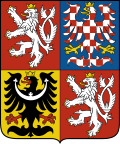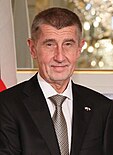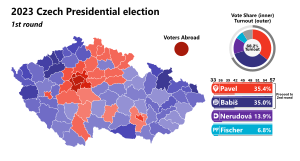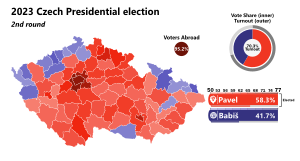
Back انتخابات الرئاسة التشيكية 2023 Arabic Президентски избори в Чехия (2023) Bulgarian Volba prezidenta České republiky 2023 Czech Präsidentschaftswahl in Tschechien 2023 German Τσεχικές προεδρικές εκλογές 2023 Greek Elección presidencial de la República Checa de 2023 Spanish انتخابات ریاست جمهوری جمهوری چک (۲۰۲۳) Persian Tšekin presidentinvaali 2023 Finnish Élection présidentielle tchèque de 2023 French הבחירות לנשיאות צ'כיה 2023 HE
| ||||||||||||||||
| Turnout | ||||||||||||||||
|---|---|---|---|---|---|---|---|---|---|---|---|---|---|---|---|---|
| ||||||||||||||||
| ||||||||||||||||
 |
|---|
|
|
Presidential elections were held in the Czech Republic in January 2023, resulting in the election of Petr Pavel. Incumbent president Miloš Zeman was not eligible to run due to the two-term limit.
The first round took place on 13 and 14 January. Petr Pavel, former chair of the NATO Military Committee, ran as an independent on a pro-Western, pro-European platform,[1] and was one of three candidates backed by the centre-right governing alliance Spolu.[2] He won the first round of the election with 35.40% of the popular vote, ahead of Andrej Babiš, the former Czech prime minister running as the candidate of ANO 2011, who finished second with 34.99%.[3] Babiš had expressed opposition to Czech support for Ukraine after the Russian invasion and was characterised in the media as using populist rhetoric.[4][5] For the runoff, Pavel was backed by most eliminated candidates and by the incumbent prime minister Petr Fiala, while Babiš received an endorsement from the Communist Party of Bohemia and Moravia[6] and the outgoing president Zeman.[7]
The second round was held on 27 and 28 January. Pavel won the runoff against Babiš with 58.33% of the vote to become the Czech Republic president-elect. He assumed office on 9 March 2023, replacing Zeman.[8][9] Babiš conceded defeat and congratulated Pavel.[10] Voter turnout in the second round was a little above 70%, the highest in a direct Czech presidential election and the highest in any national Czech election since 1998.[11]
The campaign was widely described in the media as divisive. The outcome of the election was viewed as a sign of support for the West in the context of the War in Ukraine,[12] and is expected to strengthen Czech ties with the European Union and the United States.[13]
- ^ Tait, Robert. "Pro-western Petr Pavel sweeps to landslide win in race for Czech presidency". The Guardian. Retrieved 31 January 2023.
- ^ Lazarová, Daniela (28 January 2023). "Retired army general Petr Pavel elected next president of Czechia". Radio Prague International. Retrieved 28 January 2023.
- ^ Di Sario, Frederica (14 January 2023). "Pro-Western retired general leads first round in Czech presidential election". Politico. Retrieved 28 January 2023.
- ^ Cameron, Rob. "Petr Pavel: Ex-general beats populist rival in Czech election". BBC News. Retrieved 31 January 2023.
- ^ Bauerova, Ladka; Rauhala, Emily. "Retired Gen. Pavel defeats billionaire Babis in Czech election". The Washington Post. Retrieved 31 January 2023.
- ^ Rambousková, Michaela (19 January 2023). "Volte Babiše, Pavel je peklo, vyzvala KSČM své příznivce". Seznam Zprávy (in Czech). Retrieved 1 February 2023.
- ^ "Pro-Western war hero Petr Pavel looks set to sweep Czech presidential vote". France 24. 27 January 2023. Retrieved 28 January 2023.
- ^ Pirodsky, Jason (28 January 2023). "Petr Pavel elected President of the Czech Republic". Expats. Retrieved 28 January 2023.
- ^ "Inaugurace nově zvoleného prezidenta Petra Pavla proběhne 9. března, oznámila předsedkyně Sněmovny". iRozhlas (in Czech). 28 January 2023. Retrieved 28 January 2023.
- ^ Muller, Robert; Lopatka, Jan (28 January 2023). "Retired Czech general Pavel wins presidential election". Reuters. Retrieved 28 January 2023.
- ^ "Prezidentské volby 2023" (in Czech). Seznam zprávy. Retrieved 28 January 2023.
- ^ Gosling, Tim. "Czech Republic secures pro-West direction as ex-NATO general wins". Al Jazeera. Retrieved 31 January 2023.
- ^ "New Czech president expected to foster EU, Ukraine ties". France 24. AFP. Retrieved 31 January 2023.



